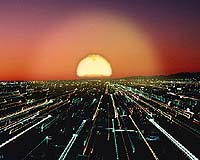| . |  |
. |
Jiegu, China (AFP) April 20, 2010 Relief supplies poured into a remote Tibetan region in northwest China Monday as two women and a girl were rescued from the rubble more than five days after a quake that killed more than 2,000. Chinese authorities ramped up the disaster response, clogging roads leading into Qinghai province's Yushu prefecture with truckloads of food, tents and quilts, but warned that icy weather could bring more misery in the days ahead. In rare good news, rescuers Monday pulled Wujin Cuomao, 68, and Cairen Baji, 4, out of a collapsed building in the town of Jiegu after relatives kept them alive by passing food and water into the debris. State television broadcast images of a healthy looking but anxious Wujin Cuomao being lifted onto a stretcher, while another rescue worker clad in orange was shown cradling the girl in his arms in an emergency vehicle. Both appeared to be ethnic Tibetans, who make up more than 90 percent of the Chinese region's people. Another Tibetan woman in her thirties was also rescued after 130 hours under the ruins of a collapsed building, state television said. Hundreds of kilometres away, AFP journalists saw convoys of military trucks, civilian aid vehicles and ambulances heading to the disaster area on the Tibetan plateau, known as the "Roof of the World". The convoys will be a welcome sight after the authorities warned at the weekend that clothing, food and water remained in short supply, as President Hu Jintao visited the zone. The quake region is a rugged zone at an elevation of around 4,000 metres (13,000 feet), factors that government officials have blamed for hindering response efforts. State news agency Xinhua said early Tuesday the death toll had risen by nearly 100 to 2,039 with 195 still missing after the quake, which struck Wednesday with a magnitude of 6.9. It also injured 12,135 people and left tens of thousands homeless. Of the injured, more than 1,400 were said to be in serious condition. In Jiegu, Tibetan monks in maroon robes continued to take a lead role in the emergency response, helping to clear the debris of flattened structures and distribute food. At the Jiegu monastery perched on foothills overlooking the town, around 50 monks loaded bottles of water and instant noodles into a truck bound for quake-hit villages. Poor weather was forecast for the next three days. Intermittent rain and snow have added to the suffering of victims sleeping outside in frigid weather after thousands of homes collapsed. "Snow, icy roads and sudden high winds on some roads threaten transportation and relief work," the National Meteorological Centre said. Rescuers and survivors also face frequent aftershocks -- more than 1,200 aftershocks have shaken the region since the main quake struck. To head off the risk of deadly disease outbreaks, the bodies of hundreds of quake victims were cremated outside Jiegu on Saturday on a massive funeral pyre piled high with naked corpses and set ablaze by chanting Buddhist monks. President Hu toured the quake zone a day later, comforting residents and calling on rescuers to keep searching for survivors. Experts say the chances of finding trapped victims alive following such disasters drop off sharply after the first 72 hours. "I assure you that the (communist) party and the government will definitely help quake victims rebuild homes and resume classes for children as soon as possible," Hu told a local Tibetan in images broadcast on state television. The Dalai Lama -- Tibet's exiled spiritual leader who was born in Qinghai and later fled the Himalayan region after a failed anti-Chinese uprising in 1959 -- has appealed to the government to let him visit the victims. Tibetans in Jiegu expressed hope the Dalai Lama would be allowed into the region but it looked unlikely the request would be granted by China, which has branded the Nobel Peace Prize winner a separatist. Jia Qinglin, fourth in China's communist party hierarchy, warned of "outside hostile forces that are trying to disrupt and damage quake relief work", without saying what these were but in apparent reference to the Dalai Lama. "Under these circumstances, we must uphold quake relief work on the one hand and unity and stability on the other hand," he was quoted as saying Monday by Xinhua. Yushu was hit by violent anti-Chinese riots that began in March 2008 in the Tibetan capital Lhasa and later swept across the Tibetan plateau.
Share This Article With Planet Earth
Related Links Bringing Order To A World Of Disasters A world of storm and tempest When the Earth Quakes
 Surviving the apocalypse -- in comfort
Surviving the apocalypse -- in comfortWashington (AFP) April 16, 2010 Worried about where to take refuge in case of an asteroid hitting the Earth, a nuclear attack or some other apocalyptic event? An American business has the answer: an underground bunker equipped with all the modern comforts. "You can't predict, but you can prepare," says the website of Vivos, which plans to sell 4,000 places in 20 nuclear-proof shelters, all on US territory. The co ... read more |
|
| The content herein, unless otherwise known to be public domain, are Copyright 1995-2010 - SpaceDaily. AFP and UPI Wire Stories are copyright Agence France-Presse and United Press International. ESA Portal Reports are copyright European Space Agency. All NASA sourced material is public domain. Additional copyrights may apply in whole or part to other bona fide parties. Advertising does not imply endorsement,agreement or approval of any opinions, statements or information provided by SpaceDaily on any Web page published or hosted by SpaceDaily. Privacy Statement |